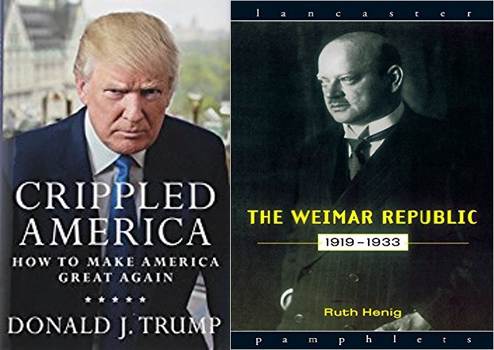
 “This hardening of attitude was symbolised by the election in late 1928 of Alfred Hugenberg as chairman of the DNVP. Hugenburg had been managing director of Krupps steel works before the war, and was now a wealthy press baron, with a string of newspapers and news agencies, as well as interests in film companies across Germany. He was an abrasive and intransigent nationalist, described as ‘opinionated and confrontational’. He believed in the exercise of ‘dynamic force through principled confrontation’ and made it his mission to harry the new government relentlessly, and to organise anti-republican propaganda of an increasingly hysterical kind. As we shall see, his willingness to join forces with other racist and nationalist parties gave Hitler a national platform which he was not slow to exploit.”
“This hardening of attitude was symbolised by the election in late 1928 of Alfred Hugenberg as chairman of the DNVP. Hugenburg had been managing director of Krupps steel works before the war, and was now a wealthy press baron, with a string of newspapers and news agencies, as well as interests in film companies across Germany. He was an abrasive and intransigent nationalist, described as ‘opinionated and confrontational’. He believed in the exercise of ‘dynamic force through principled confrontation’ and made it his mission to harry the new government relentlessly, and to organise anti-republican propaganda of an increasingly hysterical kind. As we shall see, his willingness to join forces with other racist and nationalist parties gave Hitler a national platform which he was not slow to exploit.”“The spectre of’national decline’ obsessed writers and artists on the right, and was a fear shared by large numbers of former soldiers and members of nationalist organisations. They believed that the Weimar Republic was hastening Germany’s decline as a strong power by promoting political divisions, internationalism and class war. What was required to stop the decay was national unity, a strengthening of authority at the top symbolised by a more powerful President, and an ideology of struggle, discipline and solidarity. For people holding such beliefs, war, far from being a destructive force, had been an exhilarating and uplifting experience which had unified the nation. They felt that some sort of struggle was becoming ever more necessary in order to pull the country out of its lethargy and direct it once more to heroic exploits.”
― from “The Weimar Republic 1919-1933 (Lancaster Pamphlets)”